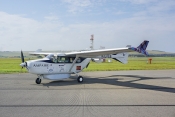Ampaire Demonstrates First Hybrid Electric Aircraft in Scotland
Thursday 12th August 2021
Ampaire, a leader in electric aviation, celebrates the first hybrid electric flights in Scotland today, crossing the Pentland Firth from Kirkwall Airport (KOI) on the Orkney Isles to regional airport Wick John O’Groats Airport (WIC) in the north of mainland Scotland. This milestone marks the first set of demonstration flights in the UK.
The trials, the first to operate on a viable regional airline route, are part of the Sustainable Aviation Test Environment (SATE) project, which is being led by Highlands and Islands Airports Limited (HIAL).
Funded by UK Research and Innovation (UKRI) through the Industrial Strategy Challenge Fund, SATE is based at Kirkwall Airport in Orkney, which is also home to the UK’s first operationally based low-carbon aviation test center. SATE forms part of the UKRI’s Future Flight Challenge, created to test low-carbon aviation technologies, as well as investigate the airport infrastructure necessary to support sustainable aviation.
Ampaire’s Electric EEL technology demonstrator, a modified six-seat Cessna 337, runs on battery power and a conventional combustion engine. The company is developing a line of hybrid electric powertrain upgrades that will reduce emissions and operating costs by as much as 25 percent initially, allowing regional airlines to better serve lifeline routes in Scotland and around the world.
Ampaire test pilot Justin Gillen commented:
“ Today’s flight to Wick went without a hitch, flying at 3500 feet and 120 miles per hour. The Electric EEL is easy to fly and we’ve achieved a total five hours here so far.”
“This is an important first step to decarbonizing Scottish regional aviation, while lowering the cost of air service,” said Ampaire founder and CEO Kevin Noertker. “It’s a model for what Ampaire will be able to offer regional carriers everywhere.” The company sees its hybrid electric upgrades as a catalyst to zero-emission, all-electric aircraft, as battery technology advances and airport charging infrastructure matures.
“With CO2 emissions rising 70 percent faster than predicted,” said Noertker, “transition to zero emission technology is critical. We’re pleased to be taking a big step in that direction here in Scotland.”
Welcoming the initiative, Graeme Dey, Scottish Government Minister for Transport commented: “The Kirkwall test center and companies such as Ampaire put Scotland at the forefront of the transition to low-carbon aviation. These demo flights are an important step towards delivering our commitment to decarbonize scheduled passenger flights within Scotland by 2040.”
Susan Ying, Ampaire SVP for Global Operations commented: “We are delighted to have made history in Scotland this week with these pioneering hybrid electric flights on commercially viable lifeline routes, an important segue to scheduled, sustainable air service.”
“Hybrid-electric aircraft achieve two objectives: reducing harmful emissions and reducing cost of operations to the point that routes such as Wick-Kirkwall become viable for regional carriers. They can also make current routes more profitable while lowering fares and strengthening connectivity.”
Lorna Jack, chair of HIAL, said: “The SATE project is a very important collaboration for HIAL . Our involvement means we can support innovative projects from our partners to achieve a shared goal, decarbonize our operations and deliver environmentally sustainable aviation. Ampaire is leading the way in delivering electric-powered aircraft that could provide a viable alternative power source for the aviation sector. It is very exciting to see this technology being tested for the first time in Scotland and we are proud that Kirkwall airport is the hub for this and future SATE projects.”
“Our aim is for HIAL to be at the forefront of Scotland’s efforts to transition to a low carbon future,” she added.
Simon Masters, Deputy Challenge Director and UKRI Future Flight Challenge said :
“The Future Flight Challenge is leading the development of ambitious new aviation technologies, funding projects that will make air travel greener and improving connections to rural and remote communities. We are proud to be working with Ampaire and their partners on these cutting-edge projects that will showcase how innovation can deliver tangible benefits to local communities. I’m looking forward to working with this world-class consortium as they move forward with their aircraft trials.”
With the completion of flight trials through the SATE project, the Ampaire aircraft will travel on to South West England where it will perform further demonstration flights between Exeter and Cornwall as part of the Ampaire-led 2ZERO (Towards Zero Emissions in Regional Aircraft Operations) project.

Ampaire debuts its hybrid/electric EEL in Orkney, Scotland this week.
Photo: Neil Thain
Editors notes:
About Ampaire
Ampaire is leading the charge in aircraft electrification. Ampaire Ltd. is based in the UK, a subsidiary of the Los Angeles-based company Ampaire Inc. Ampaire's mission is to be the world’s most trusted developer of practical and compelling electric aircraft. To start, the company is upgrading existing passenger aircraft to electric power—the quickest and most capital efficient approach to making commercial electric air travel a reality.
Extending the availability of electric technology furthers Ampaire’s mission to move the world forward, faster, and accelerate the industry’s path to zero emission travel. Electrification has the potential to unleash a new mobility market of previously uncaptured opportunity. The Union Bank of Switzerland estimates the global opportunity for hybrid-electric aircraft at $178 billion by 2040.
Ampaire is focused on developing hybrid electric powertrains for existing popular commuter aircraft in the 9 to 19-seat category, such as the Cessna Grand Caravan and Twin Otter. There are tens of thousands of such aircraft eligible for powertrain upgrades worldwide.
Ampaire has scored a series of industry firsts since the Electric EEL’s maiden flight in 2019. That first aircraft currently flies as a technology demonstrator at the company’s headquarters in Los Angeles and is serving as a test platform for new technologies under contract to the Department of Energy’s ARPA-e advanced programs unit.
The second EEL, now flying in the UK, made a landmark 341-statute-mile Los Angeles to San Francisco flight in 2020 before being shipped to Hawaii for flight trials with Mokulele Airlines, the first such demonstration program with an airline.
In February 2021, Surf Air Mobility entered into a definitive agreement to buy Ampaire.
For more information, visit www.ampaire.com.
About Surf Air Mobility
Surf Air Mobility is a Los Angeles-based electric aviation and air travel company reinventing flying through the power of electrification. They are building the regional air infrastructure to sustainably connect the world’s communities. The company has flown the world’s largest hybrid electric aircraft, and intends to bring electrified aircraft to market at scale in order to substantially reduce the cost and environmental impact of flying. With a management team of experts with deep experience across aviation, electrification, and consumer technology, Surf Air Mobility is the parent company of Surf Air, Blackbird, and has entered into a definitive agreement to buy Ampaire. For more information, visit: https://surfairmobility.com.
About Highlands and Islands Airports Limited:
Highlands and Islands Airports Limited runs a network of 11 airports across Scotland, providing a vital transport link for remote communities such as Tiree, Shetland, Islay, the Outer Hebrides and Caithness. HIAL airports are regional hubs in their area, supporting everything from oil and gas helicopter operations to mail delivery and lighthouse maintenance, as well as passenger transit. In 2017, the HIAL group handled more than 1.7 million passengers and now connects Scotland to more than 30 UK and international destinations including Amsterdam, Geneva, Bergen, London, Dublin, Edinburgh and Glasgow, with many passengers transferring on to numerous countries worldwide. HIAL is headquartered in Inverness and employs approximately 600 people across its 11 airports: Campbeltown, Islay, Tiree, Barra, Benbecula, Stornoway, Sumburgh, Kirkwall, Wick-John O’Groats, Inverness and Dundee airports. Kirkwall Airport is particularly suited as a test environment location due to the variety of routes it offers which include: short hops to the inter- islands airfields, e.g. Westray - best known for being one of the two airports joined by the shortest scheduled flight in the world and operated by Orkney Island Council. In addition, there are regular air services to Aberdeen, Edinburgh and Glasgow, with a summer service to Norway.
About SATE:
SATE is the UK’s first operationally based aviation test center, based at Kirkwall Airport in Orkney. Launched as part of UKRI’s Future Flight Challenge which supports the development of greener ways to fly, the project will test different types of low-carbon aircraft to identify the next generation of air services as well as the operational airport infrastructure necessary to support sustainable aviation.
SATE will also address the challenge to improve UK regional air connectivity and helping to decarbonize the Highlands and Islands region, the innovative project will stimulate job creation and use local renewable energy, supporting Orkney’s net zero ambitions.
Led by HIAL, the SATE project brings together an international consortium of 13 partners including aviation industry specialists, local Orkney and Caithness businesses, public sector bodies and academia.
About UK Research and Innovation: UK Research and Innovation is a new body which works in partnership with universities, research organisations, businesses, charities, and government to create the best possible environment for research and innovation to flourish. It aims to maximize the contribution of each of the component parts, working individually and collectively. UKRI works with many partners to benefit everyone through knowledge, talent and ideas. For more information visit www.ukri.org
About Industrial Strategy Challenge Fund: The Industrial Strategy Challenge Fund aims to bring together the UK’s world leading research with business to meet the major industrial and societal challenges of our time. The fund was created to provide funding and support to UK businesses and researchers, part of the government’s £4.7 billion increase in research and development over the next four years. It was designed to ensure that research and innovation takes centre stage in the Government’s modern Industrial Strategy. It is run by UK Research and Innovation.
Latest News

Tuesday 4th March 2025
Gama Aviation sees increasing business aviation traffic through Sharjah International Airport









Get Social
Twitter Linked in Facebook Instagram